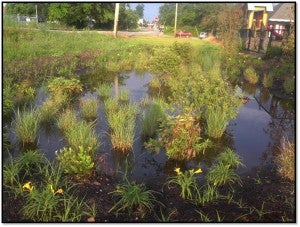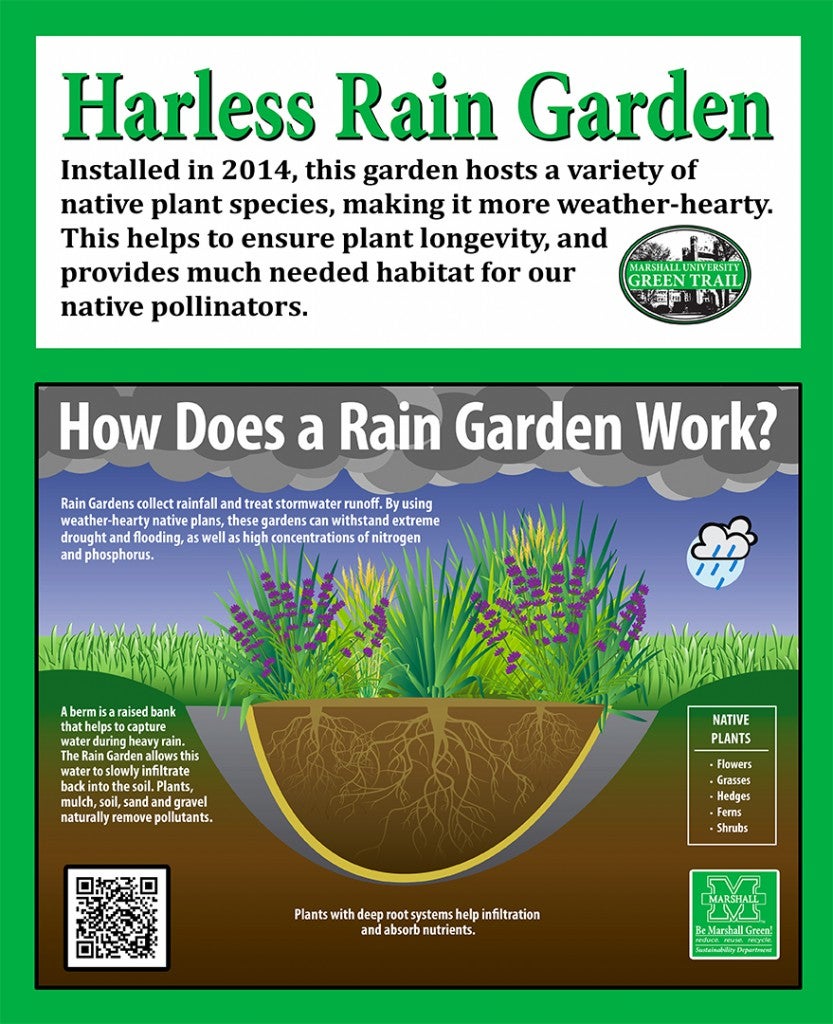A Rain Garden was installed at 1701 5th Ave., behind the Harless Dining Hall. Plants were chosen to also help support native pollinators.
This garden assists with storm water management and pollutant filtration. Rain gardens divert rainfall from local storm water systems. This is important, as storm water systems can sometimes overflow and flood with heavy and/or extended rainfall. Rain gardens act as a water filtration system by diverting runoff water from streets and drive ways which could contain oil and other chemicals.
During construction, the area was trenched and sloped the length of the garden to the center. Next, a perforated drain pipe was installed and covered with limestone/peat/moss, sand, and top soil. Plants chosen for this garden include perennials and annuals such as: Laropi, Echinacea/Cone Flowers, Irises, Golden Junipers, a River Birch tree, a Crab Apple tree, Milk Weed, Datura, cypress Vine, Impatiens, Salvia, Spider Plants, Sun Flowers. The planting bed was finished with mulch and stepping stones.
Marshall’s first Rain Garden, under the supervision of Travis Bailey with MU Health and Safety, and with the assistance of Mark Buchanan of the West Virginia Conservation Agency, was installed spring of 2013 behind the Marshall Child Development Academy.
This garden is host to many native plant species, making it more weather-hearty for our region, ensuring the longevity of the rain garden, and providing habitat for native pollinators.
What Is A Rain Garden?
A rain garden is a natural or man-made depression designed to capture storm water run-off from roofs, driveways, and other impervious areas. These rain gardens capture the water before reaching lakes, ponds, or rivers. A rain garden is planted with appropriate native, trees, shrubs, and flowers. Rain gardens are not only beautiful, but also enhance the surrounding water quality. When the storm water run off enters other water sources it can pollute that water by carrying contaminates that are on walkways, driveways, or rooftops. Rains gardens help protect the water by collecting the run off to soak into the ground.
Rain water run off can affect reduction in overall groundwater recharge, increase erosion, assist it loss of streams during dry times, decrease water quality, and increase flooding. Rain gardens can assist by allowing the run off water to infiltrate the water into the ground and avoid these problems
Along with improving water quality rain gardens provide other beneficial aspects. They provide a habitat for local wildlife, like a diverse group of birds, butterflies, and squirrels. They add an attractive landscape to an area, and are low maintenance. The gardens are relatively easy to install and can help improve the quality of the water from run off.
Reference:
- Healthy Landscapes: Rain Gardens. (n.d.). Retrieved from http://www.uri.edu/ce/healthylandscapes/raingarden.htm
- Watershed Council. Image retrieved from http://www.watershedcouncil.org/learn/rain-gardens/
Report By: Grif Griffiths
